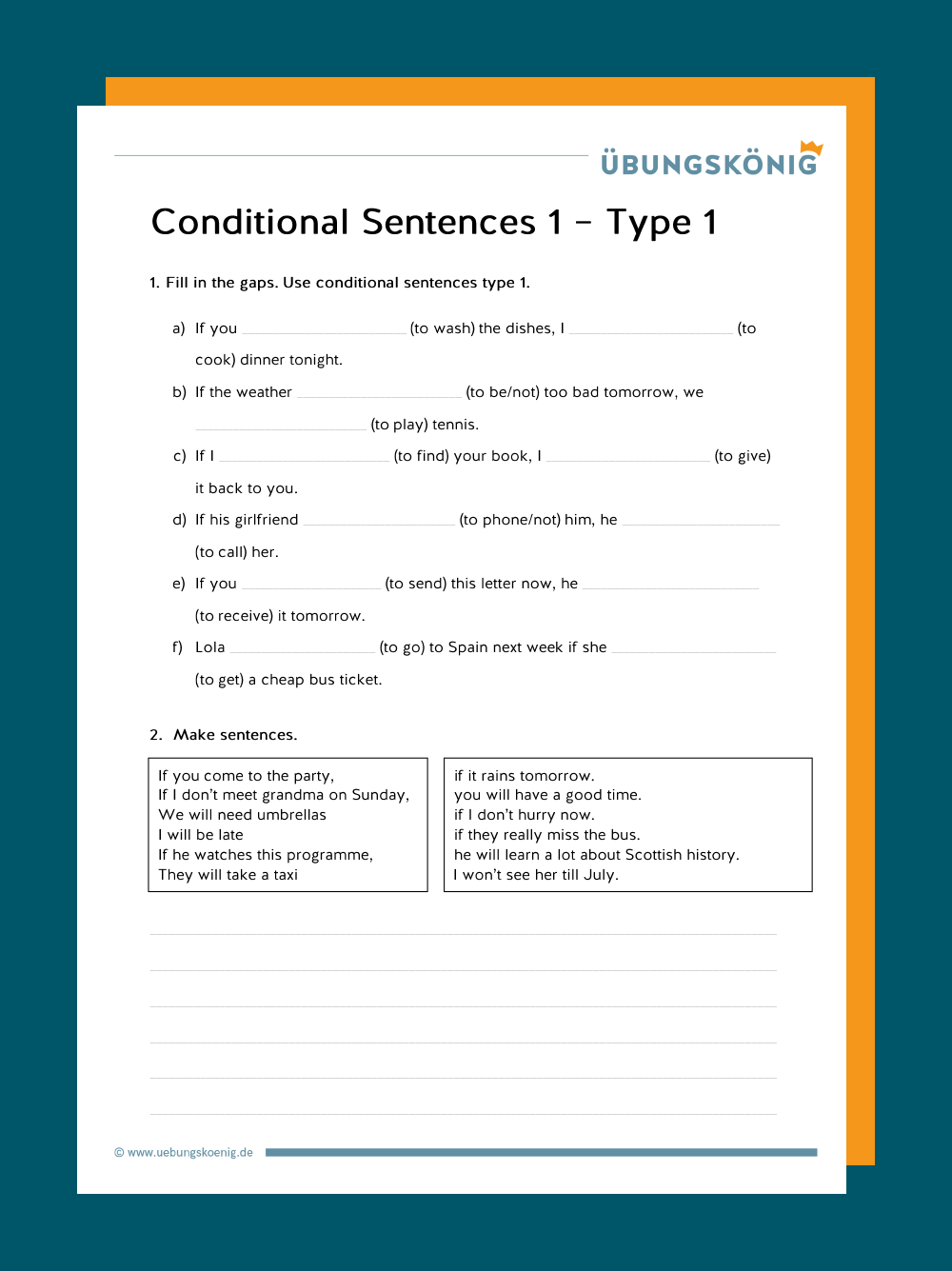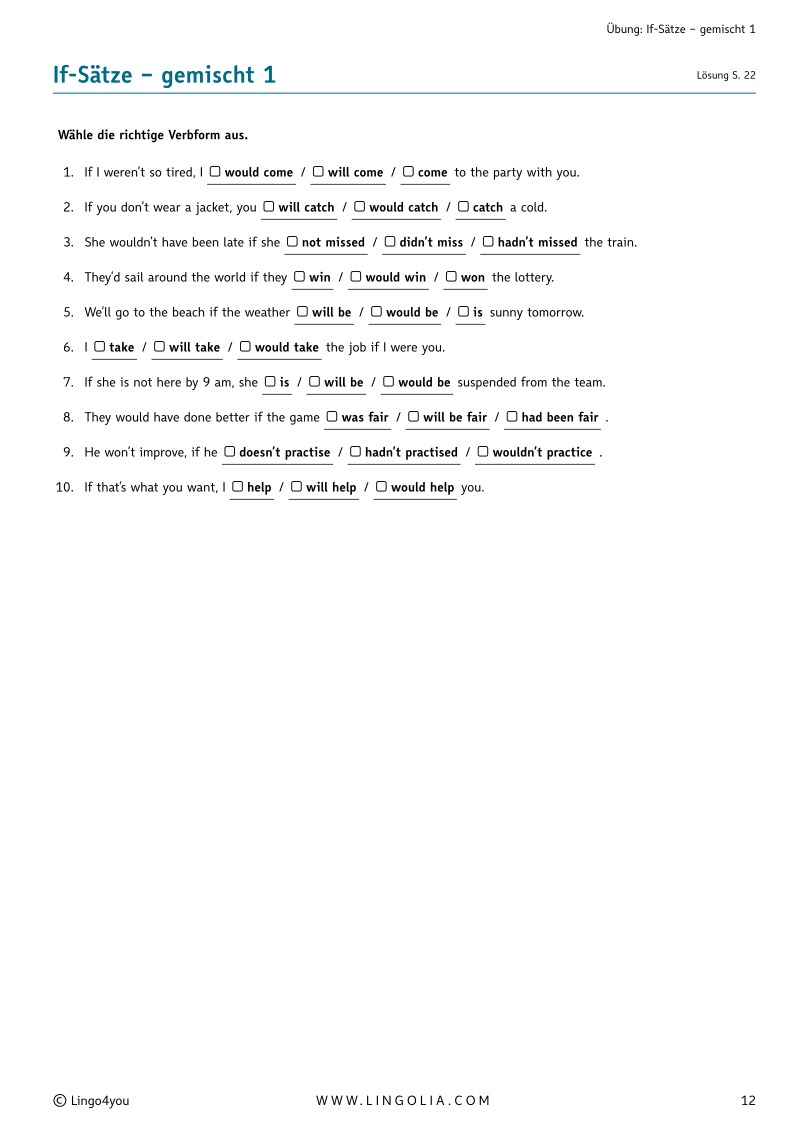
IF CLAUSE TYPE 2 English ESL Worksheets Clause, English grammar, Grammar worksheets
IF007 - Type 2 Conditional Clauses Intermediate. IF006 - Type 1 Conditional Clauses Elementary. IF005 - Type 1 Conditional Clauses Elementary. IF004-All types Intermediate. IF003- All types Intermediate. IF001- All types Intermediate. IF002- All types Intermediate. If Clauses - English grammar exercises.

Ideen fur If Clauses Typ 1 übungen
Conditionals describe the result of a certain condition. The if clause tells you the condition (If you study hard) and the main clause tells you the result (you will pass your exams). The order of the clauses does not change the meaning. If you study hard, you will pass your exams. You will pass your exams if you study hard.

Ideen fur If Clauses übungen
First Conditional - Free Exercise display incorrect answers Exercises Complete the first conditional sentences. If I (bump) into Claire, I (tell) her you said hello. People (be) happy if there (be) enough food and drink. We (call) you if your parcel (arrive) today. They (come) if she (send) them a hand-written invitation.

If Sätze / If clauses Match the sentence halves Typ 1 bis 3 Arbeitsblätter mit Übungen und
1. Form 2. Examples (if-clause at the beginning) Mind the comma after the if clause. 3. Examples (if-clause at the end) 4. Examples (affirmative and negative sentences) * We can substitute could or might for would ( should, may or must are sometimes possible, too). I would pass the exam. I could pass the exam. I might pass the exam.

If Clauses Typ 1 übungen Zum Ausdrucken The Center
Conditional Sentences, If Clauses oder If-Sätze sind Bedingungssätze. Das heißt, das Ereignis im Hauptsatz (ohne if) findet nur statt, wenn die Bedingung im Satzteil mit if erfüllt ist. Es gibt 3 Typen von If-Sätzen. If-Satz Typ 1. → Es ist möglich und auch sehr wahrscheinlich, dass die Bedingung eintritt. Bildung: if + Simple Present.

If Sätze / If clauses Match the sentence halves Typ 1 bis 3 Arbeitsblätter mit Übungen und
Hauptsatz: Would + Infinitiv If-Satz: Simple Past Sonderregel: Das Verb (to) be wird immer als "were" geschrieben. Beispiele: Beispiel 1: I would pass the test if I studied. Beispiel 2: If I won a million dollars, I would be super happy. Übungen If clause Typ 3 - Erklärung 🔍 Verwendung:

️If Clause Type 1 Worksheet Free Download Gambr.co
(01:49) If-clauses Typ 3 Übungen (02:35) Du möchtest dein Wissen zu den if -Sätzen Typ 1, 2 und 3 testen? Dann bist du hier genau richtig! Bevor es losgeht, empfehlen wir dir nochmal einen Blick auf unser Übersichtsvideo zu werfen. Anleitung: Ergänze in jedem Übungssatz die richtige Form des Verbs in Klammern.

If Clauses Typ 1 übungen Zum Ausdrucken The Center
In der Gegenwart gibt es drei verschiedene Möglichkeiten, if-clauses zu bilden. Man unterscheidet folgende Formen: Typ I, Typ II und Typ III. Inhaltlich gesehen, unterscheiden sich diese drei Typen nur dahingehend, wie wahrscheinlich es ist, dass die Bedingung auch tatsächlich eintritt. Typ I: möglich und sehr wahrscheinlich

Conditional Sentences / IfClauses
Conditional sentences with two clauses. Online - Übungen mit Lösungen zu If-Sätzen. If-Clauses für Klasse 7, Klasse 8, Klasse 9, Klasse 10. If-Sätze, Conditional Type 1, Type 2, Type 3. Für die if-Sätze Typ 1, if-Sätze Typ 2 und if-Sätze Typ 3 findest du hier Übungen mit Lösungen.

If Sätze / if clauses Typ 3 Match the sentence halves Übungen mit Lösungen PDF und Docx
Do you want to speak better English? Then you need to master the conditionals, a type of sentence that expresses a possible or hypothetical situation and its consequences. Perfect English Grammar has clear explanations and lots of practice exercises for the first, second, third and zero conditionals, as well as mixed conditionals and other variations. Learn how to use conditionals correctly.

If clauses type 1 Deutsch DAF Arbeitsblätter pdf & doc
Conditional Sentence Type 1 → It is possible and also very likely that the condition will be fulfilled. Form: if + Simple Present, will-Future Example: If I find her address, I'll send her an invitation. more on Conditional Sentences Type I Conditional Sentence Type 2 → It is possible but very unlikely, that the condition will be fulfilled.

If Clauses Worksheet Syntax Cognitive Science
Task No. 2037 Put in the verbs in brackets and form Conditional sentences type I or type II. Mind the underlined verb forms. Show example Do you need help? Conditional sentences, if-clauses type I, II, III If you come with me, I (to do) the shopping with you. Walter (to help) his mother in the garden if she reads him a story this evening.

IfSätze Lingolia Shop
Es gibt 3 Arten von if-clauses. Hier siehst du die Unterschiede: if-clauses Typ 1. Verwendung: Etwas ist möglich und sehr wahrscheinlich. Bildung: if + Simple Present , will-Future. Beispiel: If I call him, he will pick up the phone. if-clauses Typ 2. Verwendung: Etwas ist theoretisch möglich, aber eher unwahrscheinlich.

If Clauses Typ 1 übungen Zum Ausdrucken The Center
main clause: would have + past participle|irregular verb: drive-drove-driven|2. if-clause: past perfect|irregular verb: know-knew-known; Check exercise. Show all exercises for this topic. Online exercises to improve your English. Improve your English with Lingolia. Each grammar topic comes with one free exercise where you can review the basics.

Ideen fur If Clauses Typ 1 übungen
Conditional sentences - type II. If I (to come) home earlier, I (to prepare) dinner. If we (to live) in Rome, Francesco (to visit) us. If Tim and Tom (to be) older, they (to play) in our hockey team. If he (to be) my friend, I (to invite) him to my birthday party. If Susan (to study) harder, she (to be) better at school.

KOSTENLOS If Sätze / if clauses Typ 1 Match the sentence halves Übungen mit Lösungen PDF
Conditional sentences, type I, statements, if clauses, main clauses. Menu. Englisch-hilfen.de/ Conditional sentences I - statements - Exercise. Task No. 2011. Put the verbs in brackets into the gaps. Form a Conditional sentence - type I. Only use the will-future in the main clauses.